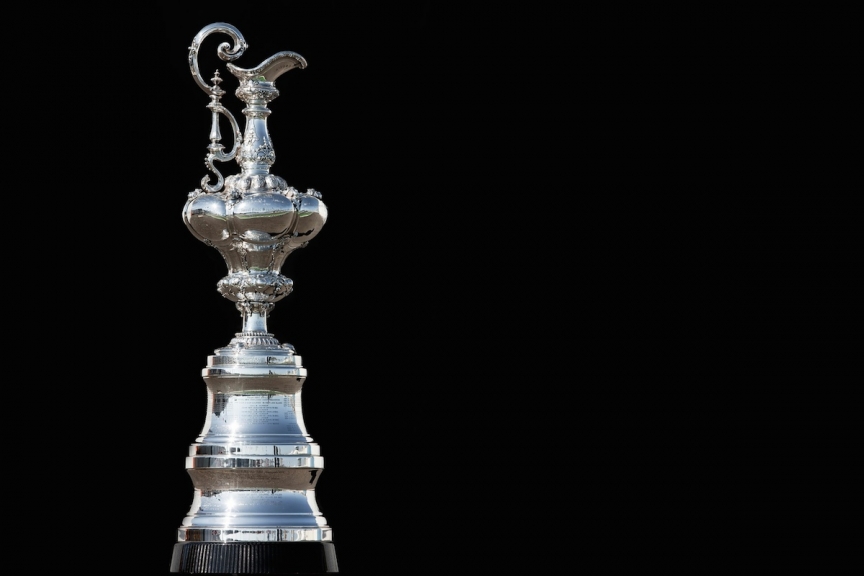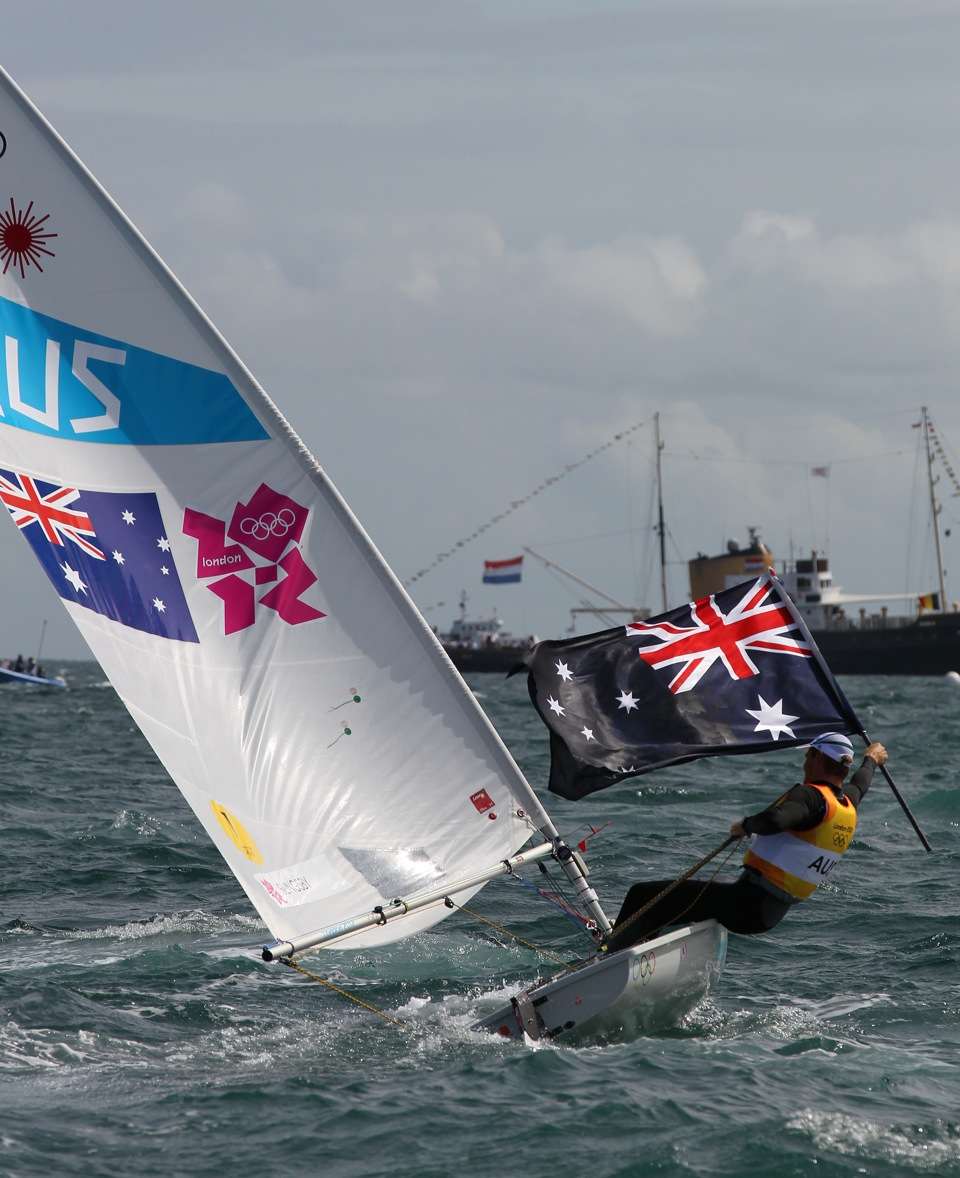Hard to imagine that it’s almost two years since London 2012 - which means it’s not much more than two years to Rio 2016. So the Princess Sofia Trophy in Palma was an interesting opportunity to gauge progress. What made it even more fascinating was just how varied the conditions were during the week, starting out light, finishing light, but with some big wind and waves in the middle of the regatta. The images from Palma were spectacular, and kudos to the incredible photographers who braved the conditions with thousands of pounds worth of equipment at risk. It reminds me of that Medal Race day at Qingdao 2008 when all hell broke loose. The supposedly sunny, light wind venue turned into Armageddon for that controversial, pitchpole-ridden 49er final, followed by Ben Ainslie (for he was not yet a knight of the realm) and his domination of the Finn Medal Race despite being the lightest sailor in the fleet.
A mountain of camera gear was trashed that day in Qingdao in the pursuit of that perfect image, although it was the lashing rain more than the waves that was the snapper’s nightmare. However, for the sailors in Palma recently it was the waves that were uppermost in their minds, particularly in the 49er and Nacra 17 fleets. We’ve long known the 49er’s tendency to throw its riders off the saddle, but judging by the entertaining photos and YouTube videos, the new Olympic catamaran certainly gives the skiff a run for its money in the pitchpole stakes.
There is a lot to celebrate about the new Nacra - the male/female combination of crew, the semi-foiling challenge, the difficulty factor - and the sailors clearly love sailing the boat. However, it has been beset by technical challenges, not least having to use metal masts while reliability problems with the carbon versions were being resolved. It reminds me of the early pioneering days of the 49er when we had all kinds of teething troubles. Again, the early versions of the mast were not quite right and the ‘Rev 5’ had to be replaced by the ‘Rev 9’. At the Australian Nationals in 1997, which effectively was the warm-up event for the first ever 49er World Championships, the boat’s designer and one of the class builders, Julian Bethwaite, was also our principal race officer. As he sent a less-than-competent fleet out into the teeth of a 30-knot, foaming Lake Macquarie, one couldn’t help but wonder if there were dollar signs rolling through the race officer’s eyes as he sent us to almost certain doom. Being an equipment supplier and also a race officer for the same class seems, to me, to be a conflict of interest.
The thing was, back then only Chris Nicholson and Dan Phillips knew how to sail the boat. Nicholson won a hat trick of 49er World Championships and is the greatest skiff sailor never to have won an Olympic medal. These days the Australian works for Emirates Team New Zealand, whose latest recruits are reigning 49er World Champions Pete Burling and Blair Tuke. Looking at the photos from Palma, it’s good to see that the 49er can still prove a challenge almost 20 years later to even the best in the world. There’s a great photo of Burling and Tuke in the process of dismounting their wayward steed, and it makes my eyes water just looking at it. I wouldn’t be surprised if the photo shows up on the inside back cover of this magazine at some point soon.
That was a particularly big day in Mallorca, with the 49er Kiwis holding on to the regatta lead despite their capsizing, and the same held true for Britain’s Giles Scott who capsized his way into the lead of the Finn fleet, and even the legendary Robert Scheidt who capsized his Laser yet led his fleet too! However, the fortunes of these three boats then went very separate ways for the rest of the week. Burling and Tuke went on to dominate the 49ers, further cementing their reputation as the team to beat. Giles Scott nearly snatched defeat from the jaws of almost certain victory after copping two yellow-flag propulsion penalties in the Medal Race. More encouragingly he seems to have that Ainslie-esque quality of being able to bounce back from tough situations and come out on top, which is what he did in Palma.
Normally you’d expect Scheidt to hammer home his advantage after leading at the half way point, but the Brazilian had an unusually poor run-in towards the end of the week, with a black flag starting disqualification forcing him to count a poor 39th in the very next race. This dropped him from 1st to 9th overall, leaving the way clear for young Australian Tom Burton to win. But let’s not forget that the 40-year-old won the Laser World Championship, the ninth of his amazing career, at the end of last year in Oman and somehow manages to regain and retain his world-beating form whilst being a dedicated family man with a wife and two young sons.
Scheidt takes every regatta seriously, but he will pick himself up and dust himself down as he - and every other Olympic aspirant - focus on the big one of the year, the ISAF Sailing World Championships in Santander this September.
Roll Tacks - May 2014
Related Articles

Roll Tacks - June 2014
Finn sailors around the world must have breathed a sigh of relief when Ben Ainslie hung up his hiking pads after squeaking that fourth gold medal at London 2012. When Sir Ben said that he was signing off from his glittering Olympic career to focus on the America’s Cup, there were times when I wondered if he would do a ‘Redgrave’ and make a comeback for Rio 2016. But Ben’s hopes and plans for his own Cup campaign seem to be coming together nicely and so we will see a new face representing Great Britain in the men’s heavyweight singlehander, a class that GBR has dominated since Iain Percy won the first of his gold medals at Sydney 2000.
Read More

America's Cup - January 2014
 Sir Ben Ainslie was the star attraction at the London Boat Show, where the four-time Olympic Champion sounded very positive about the prospects of mounting his own America’s Cup challenge. Ben, along with French star Franck Cammas, also told us his plans to race in the Extreme Sailing Series this season. With no Cup racing going on at the moment, the global cat racing circuit has given potential Cup challengers a playground to keep them occupied for the next year.
Sir Ben Ainslie was the star attraction at the London Boat Show, where the four-time Olympic Champion sounded very positive about the prospects of mounting his own America’s Cup challenge. Ben, along with French star Franck Cammas, also told us his plans to race in the Extreme Sailing Series this season. With no Cup racing going on at the moment, the global cat racing circuit has given potential Cup challengers a playground to keep them occupied for the next year.
Read More
 Sir Ben Ainslie was the star attraction at the London Boat Show, where the four-time Olympic Champion sounded very positive about the prospects of mounting his own America’s Cup challenge. Ben, along with French star Franck Cammas, also told us his plans to race in the Extreme Sailing Series this season. With no Cup racing going on at the moment, the global cat racing circuit has given potential Cup challengers a playground to keep them occupied for the next year.
Sir Ben Ainslie was the star attraction at the London Boat Show, where the four-time Olympic Champion sounded very positive about the prospects of mounting his own America’s Cup challenge. Ben, along with French star Franck Cammas, also told us his plans to race in the Extreme Sailing Series this season. With no Cup racing going on at the moment, the global cat racing circuit has given potential Cup challengers a playground to keep them occupied for the next year. 
Roll Tacks - November 2013
Is Nick Craig the best British dinghy racer ever? Well, fans of Ben Ainslie might have something to say about that. But after his seventh victory at the Endeavour Trophy, supported again by Topper Sailboats, Nick has to be considered one of the all-time greats. Not too shabby a performance by his crew, Alan Roberts, either. Alan finished a close runner-up to Nick two years ago when crewing for James Peters. Then last year Alan crewed Ben Saxton to a first-time victory at the Endeavour. To repeat the feat with a different helm, his former rival Nick, speaks volumes of Alan’s ability. A name we’ll hear a lot more about in the future.
Read More

Roll Tacks - June 2013
Great to see Luke Patience and Stu Bithell throwing themselves into the Wilson Trophy, the sort of unofficial world championship of team racing. We don’t often see the Olympic stars get involved in the nitty gritty of the amateur dinghy racing scene, and who can blame them? Must be a bit of a busman’s holiday, going sailing in your spare time. So it’s nice to see it when it does happen, like Paul Goodison and Saskia Clark doing a bit of Essex dinghy racing last summer just weeks after London 2012, and now Luke and Stu getting stuck into team racing.
Read More

Sailing Talk Podcast - Olympic Regatta Day 9 - Laser Medal Races
Read More
 The Duchess of Cambridge, Kate, makes a royal visit to Weymouth today and feels the weight of Ben Ainslie’s golden gong. But it was Ben’s girlfriend Marit Bouwmeester who was in the thick of the action in a humdinger of a medal race to decide the Radials, while Tom Slingsby won Australia’s first gold of the regatta, although there are others on the way....
The Duchess of Cambridge, Kate, makes a royal visit to Weymouth today and feels the weight of Ben Ainslie’s golden gong. But it was Ben’s girlfriend Marit Bouwmeester who was in the thick of the action in a humdinger of a medal race to decide the Radials, while Tom Slingsby won Australia’s first gold of the regatta, although there are others on the way....
